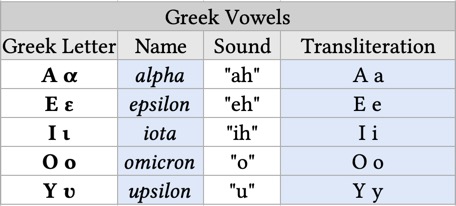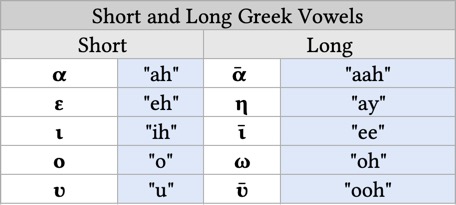1.1 Ancient Greeks spelled words the way that they were pronounced.
- Read more
-
Spell it like it sounds! As we learn the ancient Greek alphabet, it is important to note one essential principle about Greek spelling: ancient Greeks spelled words the way that they were pronounced. If the pronunciation of a word changed, so too did the spelling. Consider the verb present (preeZENT) and the noun present (PREsent), which are spelled alike but pronounced differently in English. In Greek, such words would be spelled according to their pronunciations: “preezént” and “prézent.” If a Greek community pronounced “going” as “gonna,” they would spell it as “gonna.” Homophones like “to,” “two,” and “too” would all be spelled the same, even though they have different meanings. English can at times feel like a consonant-heavy language (e.g., strengthens, catchphrase). In Greek, vowels often dominate. So we begin our introduction to the Greek alphabet with the vowels. Greek has roughly the same five vowels as English.
Like English, Greek has SHORT and LONG versions of its vowels. In ancient Greek, LONG vowels were TWO-BEAT vowel sounds. In other words, these vowels would take twice as long to pronounce as short vowels.
Notice that the letter forms for alpha, iota, and upsilon are used for both long and short vowels. The long sounds for epsilon and omicron, however, are written with different letters: eta and omega, respectively.




